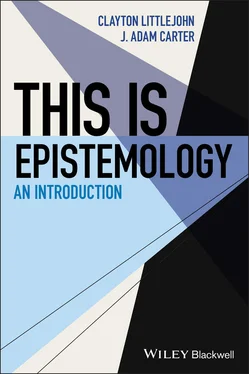1.47Even the critics of coherentism will acknowledge that there are cases where coherence seems to play an important role in the justification of our beliefs, but the crucial question isn't whether the overall coherence of a system of beliefs plays some role in the justification of belief, but whether the justification of our beliefs could be wholly determined by the coherence of the system. Coherentists like to think of justified beliefs as part of a web of belief that has a sufficiently high degree of coherence, in part because we cannot divide the parts of a web into parts, isolating the foundations and distinguishing them from the superstructure. In a web, every part is supported by the other parts, and every part lends its support to the structure as a whole.
1.48Unsurprisingly, coherentism's critics object to the view on the grounds that it fails to recognize the role that things external to the web of belief play in the justification of the beliefs that constitute the web. The coherentist doesn't look at all beyond the web of belief for further support that would justify the beliefs bound up in the web. But shouldn't she do so?
1.49If coherentists wants to convince us that our justified beliefs are justified because they cohere with each other, they need to show that the beliefs that provide rational support for our beliefs derive their justification exclusively from further beliefs, and not from anything located outside the circle of belief . If they don't, there will always be that nagging feeling that some of the justificatory work is done by intuition, experience, testimony, or something outside the circle of belief.
1.50An example should help to make this worry vivid. Imagine we are playing a game in which your friend places something on a platter, covers it with a silver cloche, and lifts the cloche with a flourish so that you can see what's on the platter. Before your friend lifts the silver cloche, you have no beliefs at all about what's on the silver platter. (For all you know, it could be anything small enough to fit under a cloche, from a battery to a coin to a piece of cheese.) After the reveal, everything changed – there's a tomato! You quickly came to believe that the thing on the platter was a tomato. Let's suppose that that's all you came to believe and let's suppose that you didn't just believe that the thing on the platter was a tomato. Let's suppose that you knew that it was and so justifiably believed that it was.
1.51If this is a plausible description of what happens, we have the makings of a good objection to coherentism:
Isolation Objection
P1.The belief that the object is a tomato couldn't be justified before the reveal.
P2. The belief that the object is a tomato could be justified after the reveal.
P3. difference in justification is a normative difference.
P4. If there is a normative difference between beliefs formed before and after the reveal, there must be some further difference between the beliefs that accounts for this normative difference.
C1. There must be some further difference between the beliefs formed before and after the reveal that accounts for this difference in justification before and after the reveal.
P5.According to the coherentist, the only difference between beliefs that could account for a difference in justification is how well they cohere with the rest of the believer's beliefs.
P6.The belief that the object is a tomato coheres with the rest of the subject's beliefs equally well before the reveal and after it.
C2.Thus, if coherentism is true, then there is no difference between the beliefs formed before and after the reveal that could account for the relevant difference in justification before and after the reveal.
The crucial point is this. Prior to the reveal, the belief that the object is a tomato wasn't supported by other beliefs. (You might have had good reason to think something would be under the cloche, but you didn't have good enough reason to believe that it was a tomato, a fruit, something red, etc.) When the tomato was revealed, there was a short time when your beliefs stayed the same but your experiences changed. It's only when there's a difference in your experience that we think that you're in a position to justifiably judge that the object is a tomato. It's worth emphasizing that what changes here and seems to account for the fact that you are now in a good position to judge that it's a tomato on the plate is your experience , not your beliefs . Thus, while it might seem to you that something of great significance changed when your experience changed, there's nothing that the coherentist can appeal to in trying to explain why it's a consequence of the reveal and the experience of the tomato that you can now justifiably judge the object to be a tomato.
1.52Might the preceding line of objection against the coherentist be too quick? Here's a natural line of response. In setting up the example, you've been asked to imagine that only one new belief is formed as a consequence of the great reveal. But perhaps that is psychologically implausible. Wouldn't we expect subjects to form an additional belief, such as the belief that the thing on the plate looks like a tomato? 30 If we have two beliefs here, couldn't the coherentist say that these two beliefs are mutually supporting? Couldn't she say that the belief that the thing is a tomato supports the belief that it looks like a tomato, and that the belief that it looks like a tomato is something that supports the belief that it is a tomato? If she said that, she could say that there is something that changes after the great reveal. Before that, she didn't have any belief that supported her belief that the thing is the tomato. After that, however, she did. She formed the beliefs that the thing is a tomato and that it looks like one concurrently, and each supports the other.
1.53But even if the coherentists said this, it wouldn't get them out of the jam. Suppose that you were playing this game with a friend. Upon seeing the tomato, you spontaneously formed these (allegedly) mutually supporting beliefs:
1 This looks like a tomato. This is a tomato.
1.54Your friend, let's suppose, formed these beliefs:
1 This looks like a lemon. This is a lemon.
1.55Now, we're not supposing that your friend suffered from some sort of illusion or hallucination. They had an experience indistinguishable from yours. We're not supposing that they're confused about how tomatoes and lemons look. We're also not supposing that you've shared your answers yet. You spontaneously judge that the beliefs in (1) are correct, and your friend spontaneously judges that the beliefs in (2) are correct. It's surely possible for one's beliefs to fail to “match” one's experience and for one to fail to notice this. Suppose that such a mistake is what happened in the case of your friend's assessment of the fruit in plain view.
1.56Yours and your friend's sets of beliefs are equally coherent. Thus, from the perspective of coherentism, there are no grounds for saying that your beliefs are better justified than your friend's beliefs. And yet it seems that there's a clear difference between your beliefs, and that your beliefs are better justified than theirs. This is a different normative difference from the one we started with, and it doesn't look like the coherentist can account for this difference.
1.57It seems that the coherentist's fixation on the internal relations between beliefs leads them to overlook the rational significance of mental factors external to belief (e.g. relations between beliefs and experiences). Moreover, it seems that a natural story about how the beliefs in (1) are justified is one that adverts to experience. Your beliefs are justified and your friend's beliefs are not because your beliefs fit your experiences and theirs do not. This difference is not a difference in terms of how coherent your beliefs are. This factor plays no role in filling the pages of Your Book of Beliefs , but this just seems to be an indication that there's more to the explanation as to how your beliefs are justified than what's contained in that book. Perhaps we cannot really tell which of your beliefs belong to the book of Your Justified Beliefs until we know something about your experiences and how they fit with your experiences.
Читать дальше












